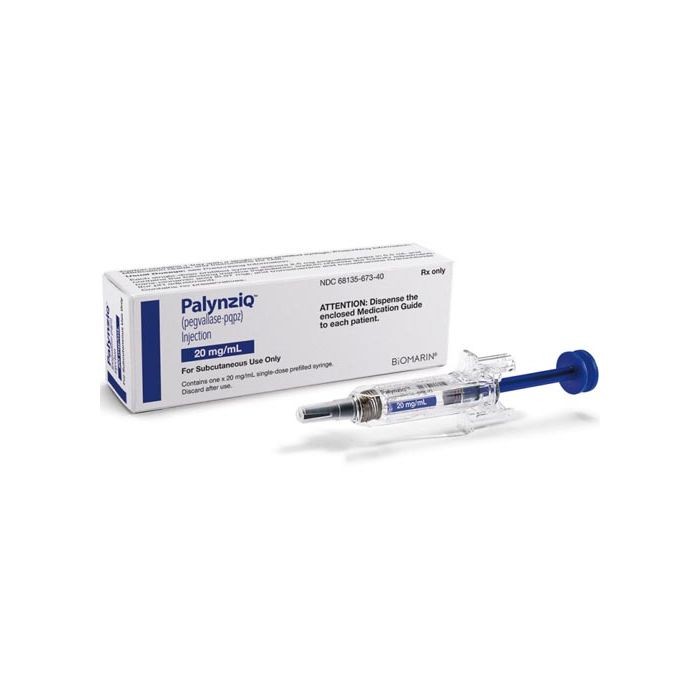
Contents
Palynziq (pegvaliase-pqpz)
Palynziq is a prescription medicine for lowering blood phenylalanine levels in adults with PKU (phenylketonuria) whose levels exceed 600 micromol/L (10 mg/dL) on current treatment.
Its safety and efficacy in children are unknown.
Palynziq is available exclusively through the Palynziq Risk Evaluation and Mitigation Strategy (REMS) Program. To receive Palynziq, you must:
- enroll in the program.
- receive education about the risk of severe allergic reaction (anaphylaxis) from a certified healthcare provider to ensure understanding of treatment risks and benefits.
- fill the prescription for auto-injectable epinephrine given by your healthcare provider and carry it at all times during treatment.
- carry the Palynziq Patient Wallet Card at all times.
Consult your healthcare provider for more information on the Palynziq REMS and enrollment.
What are the side effects?
WARNING
Palynziq can cause severe allergic reactions (anaphylaxis) at any time during treatment. They are a serious but common side effect.
- The initial Palynziq injection is administered under close observation in a healthcare setting for one hour to monitor for severe allergic reactions.
- If a severe allergic reaction occurs, immediate administration of auto-injection epinephrine and emergency medical help are necessary.
- Your healthcare provider will determine if you or your caregiver can administer Palynziq injections, recognize signs and symptoms of severe allergic reactions, administer epinephrine, and call for emergency medical help, if needed.
- Your healthcare provider may recommend an adult observer or caregiver be present during and after your Palynziq injection for at least one hour to monitor for signs and symptoms of severe allergic reactions and administer necessary epinephrine and emergency medical help.
Stop using Palynziq and seek immediate emergency medical care if you experience any of the following severe allergic reaction symptoms during treatment:
- fainting
- dizziness or lightheadedness
- sudden confusion
- trouble breathing or wheezing
- chest discomfort or tightness
- fast heart rate
- swelling of face, lips, eyes, or tongue
- throat tightness
- flushed skin
- skin rash, itching, or raised bumps
- nausea, vomiting, or diarrhea
- loss of bladder or bowel control
- Your healthcare provider may prescribe medications to take before your Palynziq injection to help mitigate allergic reaction symptoms.
- If your healthcare provider deems it safe to continue Palynziq treatment after a severe allergic reaction, your next injection will be administered in a healthcare setting under close observation.
Palynziq may also cause serious side effects, including:
- Other allergic reactions to Palynziq can occur during treatment, including rash, itching, or swelling of the face, lips, eyes, or tongue. Promptly contact your healthcare provider if you experience these symptoms. Your dose may be adjusted, treatment paused, or additional medication prescribed to manage the allergic reaction.
The most common side effects of Palynziq include:
- injection site reactions (redness, itching, pain, bruising, rash, swelling, tenderness)
- joint pain
- headache
- skin reactions that spread and last at least 14 days (itching, rash, redness)
- itching
- nausea
- stomach pain
- mouth and throat pain
- vomiting
- cough
- diarrhea
- fatigue
- low blood phenylalanine levels
This list does not encompass all possible side effects. Contact your doctor for medical advice on side effects. You may also report side effects to the FDA at 1-800-FDA-1088.
What is the recommended Palynziq dosage?
- Your healthcare provider will administer the Palynziq injection initially until you or your caregiver can self-administer.
- Your healthcare provider may prescribe medication to be taken before Palynziq injections to mitigate allergic reaction symptoms.
- If deemed capable, you or your caregiver will receive instruction on preparing and administering Palynziq injections. Consult the "Instructions for Use" for detailed instructions.
- Follow your healthcare provider’s instructions for proper Palynziq administration and dosage.
- Palynziq prefilled syringes come in 2.5 mg, 10 mg, and 20 mg strengths. You may require more than one prefilled syringe for your prescribed dose.
- Monitor your protein and phenylalanine intake. Your healthcare provider may adjust your dietary protein and phenylalanine levels based on your blood phenylalanine levels during treatment. Abide by your healthcare provider’s dietary recommendations.
- If you miss a dose, take it at your regular time. Do not double dose to compensate for a missed one.
Can Palynziq interact with other drugs?
Effect Of Palynziq On Other PEGylated Products
In a single dose study of Palynziq in adult PKU patients, two patients receiving concomitant injections of medroxyprogesterone acetate suspension (a formulation containing PEG 3350) experienced hypersensitivity reactions. One patient experienced a hypersensitivity reaction within 30 minutes following medroxyprogesterone acetate injectable suspension administration after a Palynziq dosage of 0.67 mg. Subsequently, on day 89 after the next dose of medroxyprogesterone acetate injectable suspension, the same patient experienced anaphylaxis. The other patient experienced a hypersensitivity reaction within 10 minutes following medroxyprogesterone acetate injectable suspension administration after a Palynziq dosage of 0.08 mg on day 40. Both patients had high anti-PEG IgG antibody titers around the time of their hypersensitivity reactions.
In Palynziq clinical trials, most patients developed anti-PEG IgM and IgG antibodies post-treatment. The clinical effects of concurrent use of Palynziq and other PEGylated products are unknown. Monitor patients receiving concomitant treatment for hypersensitivity reactions, including anaphylaxis.
Is Palynziq safe during pregnancy or breastfeeding?
Inform your healthcare provider of all your medical conditions, including if you:
- are pregnant, planning to become pregnant, or suspect you are pregnant. Palynziq may harm your unborn baby. Alert your healthcare provider immediately if you become or suspect pregnancy.
- High or low phenylalanine levels during pregnancy can affect your unborn baby. Work with your healthcare provider to effectively manage blood phenylalanine levels while pregnant and discuss the risks and benefits of taking Palynziq during pregnancy. Follow your healthcare provider’s recommended phenylalanine levels during pregnancy.
- Pregnancy Surveillance Program. A program exists for monitoring the health of females taking Palynziq during pregnancy, or who become or suspect pregnancy within one month after their last dose of Palynziq. Contact your healthcare provider or BioMarin at 1-866-906-6100 for information on participation.
Subscribe to MedicineNet’s Children’s Health & Parenting Newsletter
By clicking "Submit," I agree to the MedicineNet Terms and Conditions and Privacy Policy. I also agree to receive emails from MedicineNet and I understand that I may opt out of MedicineNet subscriptions at any time.
Summary
Palynziq is a prescription medicine used to lower blood phenylalanine levels in adults with uncontrolled PKU. Due to the high risk of severe allergic reactions, enrollment in a special program is required to take this drug.
Palynziq is a prescription medicine used to lower blood phenylalanine levels in adults with uncontrolled PKU. Due to the high risk of severe allergic reactions, enrollment in a special program is required to take this drug.


